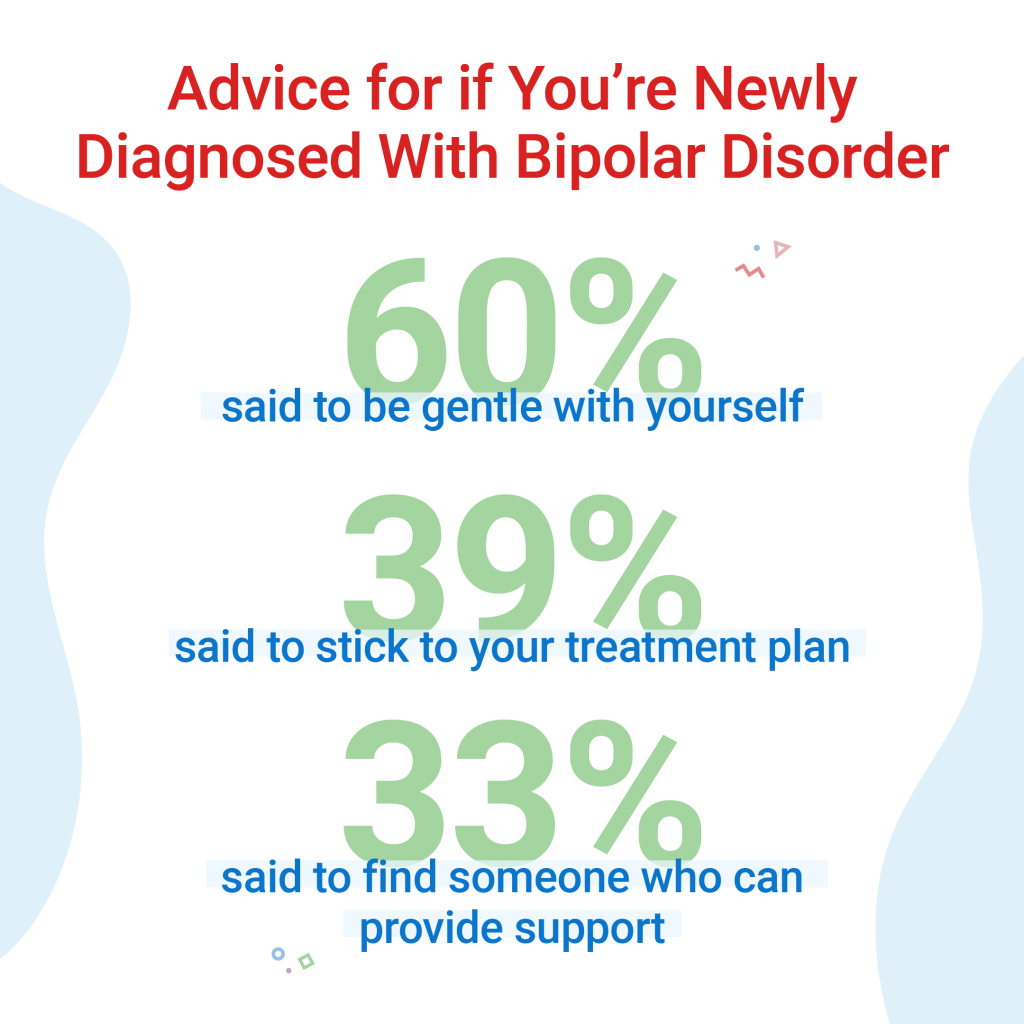Newly Diagnosed With Bipolar Disorder? Here Are 16 Pieces of Advice to Get You Started
Editor's Note
Answers may have been slightly altered for length or clarity.
So, you’ve been searching for answers to why your brain works the way it does and after months of speculation — or maybe not — you’ve received an answer in the form of a diagnosis. You have bipolar disorder.
• What is Bipolar disorder?
Receiving a new diagnosis can be a confusing time. Maybe you expected this, and you’ve already done your research and you’re prepared to tackle it head-on. It might have come as a shock, though — the rug pulled out from under you. First thing’s first — don’t panic. Lots of people have been exactly where you are now, and you’re going to be OK. While you find your footing, though, we asked our bipolar disorder community for the advice they want you to know after a fresh bipolar disorder diagnosis.
This is what helped them. Here’s what you should know:
“Learn about your diagnosed bipolar.” — @moonlotus09
“Take medication, find a great psychologist, find a psychiatrist that actually spends time with you and listens to you.” — @robinkw
”Don’t freak out, and remind yourself that you are not alone, and once diagnosed properly, you have a good chance of finding help. Gather a lot of patience. Breathe deeply. Treat yourself to something tasty from time to time.” — @tallyaron
“Be gentle with yourself. Remind yourself that it is not your fault. Don’t forget that the bad things that you did during a manic episode is a symptom of the disease and not a character flaw.” — @eskimine
“Love, value, and accept yourself no matter what.” — @locomotive8
“Find a group through your local mental health agency. Then watch and choose someone as a mentor. I compare it to how I understand AA. Once you pick someone that has been through it and is stable, you can reach out to them and let them guide you. That’s what I accidentally did and it meant almost life or death for me. I’m still tight with my bipolar buddy after five years. And I was extremely uncomfortable going. And, please be patient with your medication. It’s a tricky process sometimes to find your mix. It’s not the same for everyone and it can take 5 to 60 days to feel the effects. Be patient and trust yourself.” — @lreinbolt

Editor’s note: since some people in the community answered more than once, the above graphic does not add up to 100%.
It’s OK to cry. When I was first diagnosed, I was stunned. Then, all I wanted to do was cry but I didn’t. In the coming months, all I wanted to do was cry. And again, I didn’t. If I let myself cry about it then it would become true. Let me tell you something I have learned: it’s true whether you cry or not. So cry. Cry hard and then pick yourself up and be that wonderfully strong person that you are. You’ve got this!” — @carlybaker
“We are many. It will get better. It’s good knowing what’s going on, and now you learn to live and know.” — @raining60
“Listen to your doctors and savor every moment. And if you find yourself in a dark hole? You can climb out (with help) if you remember your one and only job is to stay alive until you feel better. And while it may take a long time, you will. In the meanwhile, as long as you are in recovery, everything else — work, spouse, even kids — can wait. If they value you the way you should be valued, they will still be there for you.” — @parklarjr
“You are not your diagnosis! It shapes your life, but it does not define who you are.” — @ldsage78
“Learn everything you can about bipolar. Then spend the rest of your life learning everything you can about you. It’s not ‘one hat, fits all.’” — @mammyinteruppted
“Please give yourself the grace that you give others.”— @heathervargo1
“Give your therapy a chance to work. Be honest with your doctor. Sometimes it takes trying several medications until the right one(s) for you is discovered. Don’t give up hope. These mood swings are not your fault. Remember that. Give yourself time to heal. Never go off your meds without talking to your doctor. Follow their advice. You are paying for their service. Do research yourself. Love yourself. You can get through this!” — @indymindy
”It is the nature of bipolar to have mood shifts between depression and “up.” It is not your fault when the switch flips, you’ve done nothing wrong. That’s just what bipolar does. Try not to struggle against it but instead learn to ride the waves.” — @ginger112
“It is quite hard but remembering to stay calm helped me greatly, along with making sure to take my meds. I would listen to small calming stories if it ever got really bad.” — @lalota_peverell
“It is a lifelong process but it gets easier. Therapy and medication are key. Patience is key. And working on self-love and self-care will get you far.” — @kelly_mc
What would you want somebody to know about their bipolar disorder diagnosis? Let us know in the comments!
Getty Images photo via valentinrussanov

